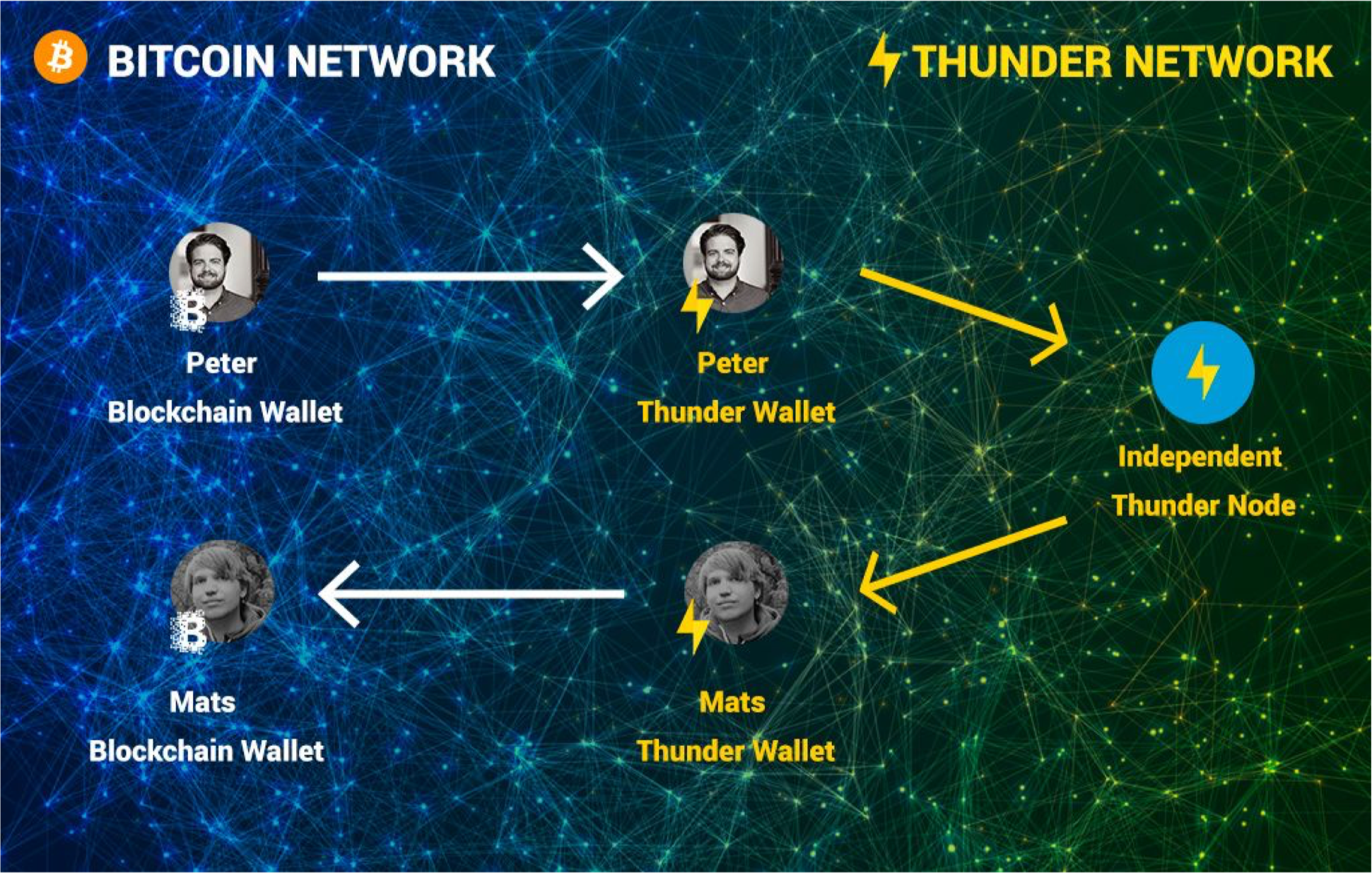Blockchain, the company behind the world’s most popular bitcoin wallet, has been quietly working on an interesting project called Thunder. The Thunder network is an alternative network of nodes that lets you make off-chain bitcoin payments in seconds and settle back to the bitcoin blockchain every now and then. And it makes me excited about bitcoin all over again.
This sounds complicated but it’s quite neat and could be a powerful innovation for bitcoin transactions. But first, let’s take a step back.
If you’ve ever tried sending a couple of bitcoins from one wallet to another, you know it can take ten or twenty minutes before the blockchain confirms the transaction.
The reason behind this is that the blockchain is a network of servers that share the same record of transactions. When you send two bitcoins, all the nodes in the blockchain are going to write a line with this transaction so that everyone can confirm that the originating wallet has lost two bitcoins and the destination wallet now has two extra bitcoins.
This is great, and this is what makes bitcoin completely decentralized. But it’s also slow, hard to scale and expensive.
Last year, Joseph Poon and Thaddeus Dryja wrote a paper about bitcoin’s scalability and speed issues, and defined Lightning networks. These alternative networks would run independently from the main bitcoin blockchain and would be able to register transactions in just a second. It uses smart contracts so that all nodes in a Lightning network don’t need to be aware of all transactions.
Yet, this was all theory. Blockchain hired Mats Jerratsch and started working on a sort of implementation of a Lightning network. This is what the company is announcing and open sourcing today. Thunder is the first implementation of a Lightning-like network. Blockchain is already running Thunder nodes and other bitcoin companies can look at the source code, provide Thunder wallets, adopt this network or fork it. Thunder can also work with other cryptocurrencies. And the startup made the first live transaction on Thunder.
While Blockchain isn’t going to use Thunder for Blockchain wallet users just yet, the startup is already thinking about real life advantages of a solution like Thunder.

With Thunder, a transaction is so fast that the network can process 100,000 transactions per second. On average, Visa handles 2,000 transactions per second and the Visa network is capable of processing 56,000 transactions per second.
To put this into perspective, Blockchain wallet users are on track to make 40 million transactions this year, or around 1.3 transaction per second. Quite impressive, but let’s be honest. While there are many other wallets out there, given that Blockchain is the most popular wallet maker, bitcoin transaction volume is very far behind Visa. The reason for this is that bitcoin transactions have been too cumbersome. So I’m convinced projects like Thunder are part of the solution.
Also important, transactions become much cheaper thanks to Thunder. When you settle back your Thunder payments to the bitcoin blockchain, there are still blockchain fees involved. But you can make many, many Thunder transactions before settling back to the blockchain — and Thunder transactions don’t involve as many nodes. If you divide the fees by the number of Thunder transactions, paying using bitcoin becomes much cheaper. Fees are so cheap that you could finally imagine making microtransactions using bitcoins.
So Thunder would make bitcoin a viable alternative to Visa. It removes many of the limitations behind the existing bitcoin protocol.
Now, there are still some roadblocks. Thunder can’t work with anyone with a bitcoin wallet just yet as the bitcoin core development team needs to release segregated witness and CHECKSEQUENCEVERIFY features. But the good news is that these features are on the roadmap and the core team wants to make Lightning networks possible. Until then, Thunder relies on trusted nodes. But with future bitcoin updates, Thunder can become a full-on Lightning network.
Thunder is an exciting project and something that could drastically change some bitcoin use cases. Many have turned to alternative cryptocurrencies such as Ether due to bitcoin’s limitations. Slowly but surely, the bitcoin community is catching up and making bitcoin payments more attractive.
